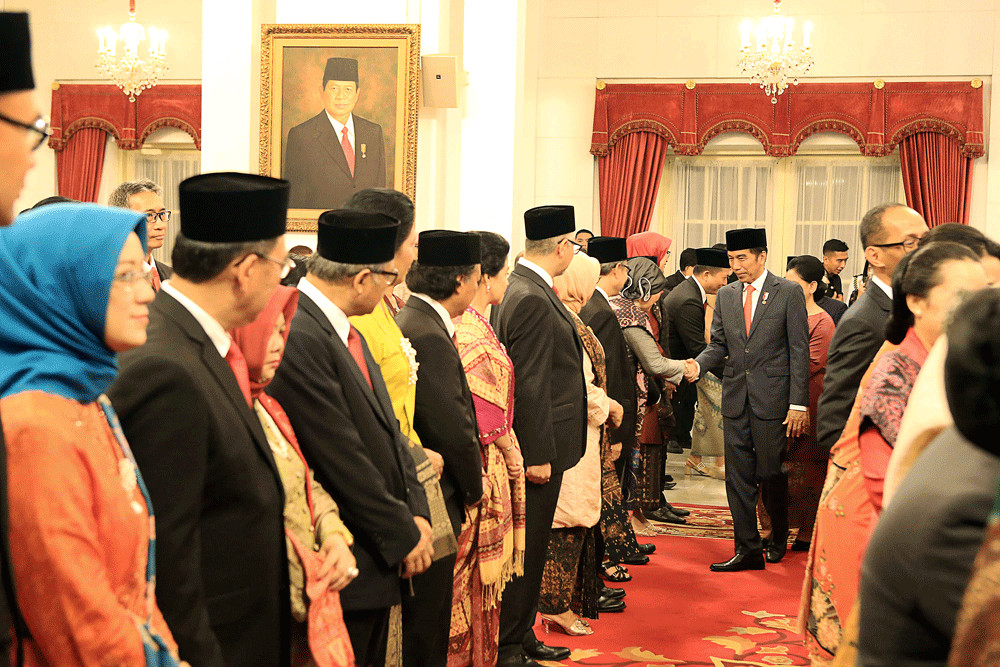Popular Reads
Top Results
Can't find what you're looking for?
View all search resultsPopular Reads
Top Results
Can't find what you're looking for?
View all search resultsThe other side of diplomats’ wining, dining
The work of our diplomats today is not only about pursuing our national interests through negotiations, but also protecting Indonesian nationals anywhere including in wars, disaster, turmoil and political conflict. In short, they have to be omnipresent.
Change text size
Gift Premium Articles
to Anyone
A
pril 6, 2015, was probably the most memorable day for three Indonesian diplomats, namely Susapto Anggoro Broto, Rahmat Hindiarta and Ainur Rifqie. Most foreign diplomats had already left Yemen’s capital, Sana’a. But these three had to stay at the Indonesian Embassy in Sana’a with one mission left: evacuating Indonesian migrant workers who were still trapped in the torn city.
Unfortunately, an air raid struck a location near the embassy at 9 a.m. Nearly half of its structure collapsed. The three diplomats and some migrant workers were injured by a collapsing wall and broken glass. Amid the chaos, the embassy staff managed to evacuate migrant workers out from Yemen safely through a land route.
In the last five years our diplomats had evacuated Indonesian nationals from several critical situations, such as in Nepal ( 2015 ), Syria (2014 to 2019), the Philippines ( 2017 ), the British Virgin Islands ( 2017 ) and Libya ( 2018 ). During this period, 4,789 Indonesians were succesfully brought back to the homeland.
Indeed, the 1961 Vienna Convention on Diplomatic Relations stipulates that a diplomatic mission’s task is to protect its nationals. Our founding fathers inserted the phrase “protecting the entire Indonesian nation and the whole of Indonesia’s bloodshed” as one of the state’s obligations in the preamble of the 1945 Constitution.
Regrettably, diplomats are still viewed as partygoers attending one diplomatic reception after another, trading laughter with counterparts over wine and lavish dinners. In the previous presidential campaign debate, candidate Prabowo Subianto referred to Indonesian diplomats as “just smiling” and being “nice”, leading to results that are just so-so. Yet, Indonesia’s contemporary diplomacy and foreign policy is very complex and multidimensional.
The work of our diplomats today is not only about pursuing our national interests through negotiations, but also protecting Indonesian nationals anywhere including in wars, disaster, turmoil and political conflict. In short, they have to be omnipresent.
For example, while voicing our national interests as a country with the world’s largest Muslim population through the Organization of Islamic Cooperation, our diplomats in Saudi Arabia have also provided various daily services and assistance to our migrant workers. Indonesian diplomats in Saudi Arabia, the United Arab Emirates, Malaysia, Hong Kong and South Korea frequently visit prisons, courts and hospitals, and argue with employers and company representatives, even driving a hundred miles to check on the number of corpses at a morgue.
While abroad, our diplomats serve as immigration officers, notaries, civil administrators, marriage administrators, interpreters, mental health counselors and litigators. In a smaller Indonesian mission, a single diplomat handles all these functions.
In the southern Philippines, our diplomats operated in Zamboanga to release Indonesians held hostage by the notorious Abu Sayyaf group. In Syria and Iraq, our diplomats went beyond the call of duty to evacuate migrant workers from areas under the Islamic State group’s control. In Nepal, our diplomats traveled 3,600 meters above sea level to find missing Indonesian trekkers in Langtang — a village buried by a massive avalanche. In various critical situations around the world, our diplomats rush into dangerous areas — when others race to flee.
As a result, in the last five years, the Foreign Ministry has saved more than 73,000 Indonesian nationals, including 41 Indonesians who were held hostage in the Philippines, Somalia and Congo, saved 279 Indonesians from the death penalty and returned Rp 570 billion (US$40.63 billion)) in financial remedies to migrant workers.
With over 3 million Indonesians living abroad and 9 million Indonesians traveling overseas every year — though only 856 diplomats serve abroad — providing protection to all of our nationals has always been a herculean task, if not mission impossible.
Unfortunately, these achievements still go unnoticed. For example, a notable foreign policy expert once wrote in this newspaper that he only remembered two achievements of the Foreign Ministry in the last five years. First, Indonesia’s nonpermanent membership of the United Nations Security Council. Second, ASEAN’s adoption of the Indo-Pacific concept, promoted by Indonesia.
Those two are indeed the ministry’s achievements. But to say that those two are the only achievements shows an obsolete perspective of what our contemporary foreign policy is and what our diplomats do today.
Scholar and author Richard N. Haas once wrote, “Foreign policy begins at home”. Indeed, foreign policy is always about fulfilling national interests, be it maintaining sovereignty, boosting the economy, or what is of the utmost importance: protecting nationals — for a nation is not a nation without its nationals.
***
Diplomat at the Foreign Ministry. The views expressed are his own.











